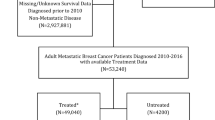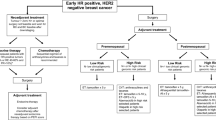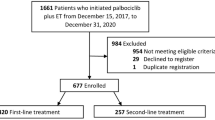Abstract
Background
Patients with estrogen receptor (ER)-positive, HER2-negative breast cancer (BC), and high-risk 21-gene recurrence score (RS) results benefit from chemotherapy. We evaluated chemotherapy refusal and survival in healthy older women with high-RS, ER-positive BC.
Methods
Retrospective review of the National Cancer Database (2010–2017) identified women ≥ 65 years of age, with ER-positive, HER2-negative, high-RS (≥ 26) BC. Patients with Charlson Comorbidity Index ≥ 1, stage III/IV disease, or incomplete data were excluded. Women were compared by chemotherapy receipt or refusal using the Cochrane–Armitage test, multivariable logistical regression modeling, the Kaplan–Meier method, and Cox’s proportional hazards modeling.
Results
6827 women met study criteria: 5449 (80%) received chemotherapy and 1378 (20%) refused. Compared to women who received chemotherapy, women who refused were older (71 vs 69 years), were diagnosed more recently (2014–2017, 67% vs 61%), and received radiation less frequently (67% vs 71%) (p ≤ 0.05). Refusal was associated with decreased 5-year OS for women 65–74 (92% vs 95%) and 75–79 (85% vs 92%) (p ≤ 0.05), but not for women ≥ 80 years old (84% vs 91%; p = 0.07). On multivariable analysis, hazard of death increased with refusal overall (HR 1.12, 95% CI 1.04–1.2); but, when stratified by age, was not increased for women ≥ 80 years (HR 1.10, 95% CI 0.80–1.51).
Conclusions
Among healthy women with high-RS, ER-positive BC, chemotherapy refusal was associated with decreased OS for women ages 65–79, but did not impact the OS of women ≥ 80 years old. Genomic testing may have limited utility in this population, warranting prudent shared decision-making and further study.



Similar content being viewed by others
Data availability
The datasets generated during and/or analyzed during the current study are not publicly available due to the data use agreement with the National Cancer Database, which restricts access to the dataset to hospitals that contribute to the NCDB. Data are available from the corresponding author on reasonable request.
References
Meresse M, Bouhnik AD, Bendiane MK et al (2017) Chemotherapy in old women with breast cancer: is age still a predictor for under treatment? Breast J 23(3):256–266. https://doi.org/10.1111/tbj.12726
Siegel RL, Miller KD, Fuchs HE, Jemal A (2022) Cancer statistics, 2022. CA Cancer J Clin 72(1):7–33. https://doi.org/10.3322/caac.21708
National Cancer Institute Surveillance, Epidemiology, and End Results Program, Cancer Stat Facts: Female Breast Cancer. Accessed March 23, 2022. https://seer.cancer.gov/statfacts/html/breast.html
Shachar SS, Hurria A, Muss HB (2016) Breast cancer in women older than 80 years. J Oncol Pract 12(2):123–132. https://doi.org/10.1200/JOP.2015.010207
Jenkins EO, Deal AM, Anders CK et al (2014) Age-specific changes in intrinsic breast cancer subtypes: a focus on older women. Oncologist 19(10):1076–1083. https://doi.org/10.1634/theoncologist.2014-0184
National Comprehensive Cancer Network Guidelines Version 2.2022 Breast Cancer. Published 2022. Accessed March 23, 2022. https://www.nccn.org/professionals/physician_gls/pdf/breast.pdf
Sparano JA, Gray RJ, Makower DF et al (2015) Prospective validation of a 21-gene expression assay in breast cancer. N Engl J Med 373(21):2005–2014. https://doi.org/10.1056/nejmoa1510764
Paik S, Tang G, Shak S et al (2006) Gene expression and benefit of chemotherapy in women with node-negative, estrogen receptor-positive breast cancer. J Clin Oncol 24(23):3726–3734. https://doi.org/10.1200/JCO.2005.04.7985
de Rijke JM, Schouten LJ, Schouten HC, Jager JJ, Koppejan AG, van den Brandt PA (1996) Age-specific differences in the diagnostics and treatment of cancer patients aged 50 years and older in the province of Limburg, The Netherlands. Ann Oncol 7(7):677–685. https://doi.org/10.1093/oxfordjournals.annonc.a010716
Dias LM, Bezerra MR, Barra WF, Rego F (2021) Refusal of medical treatment by older adults with cancer: a systematic review. Ann Palliat Med 10(4):4868–4877. https://doi.org/10.21037/apm-20-2439
Heidrun M, Karsten M, Felix M, Jan WS (2021) On the impact of premature termination of chemotherapy on relapse of breast cancer. Int J Oncol Res. https://doi.org/10.23937/2643-4563/1710028
Joseph K, Vrouwe S, Kamruzzaman A et al (2012) Outcome analysis of breast cancer patients who declined evidence-based treatment. World J Surg Oncol 10:1–5. https://doi.org/10.1186/1477-7819-10-118
Sowerbutts AM, Griffiths J, Todd C, Lavelle K (2015) Why are older women not having surgery for breast cancer? Qual Study Psychooncology 24(9):1036–1042. https://doi.org/10.1002/pon.3764
O’Connor T, Shinde A, Doan C, Katheria V, Hurria A (2013) Managing breast cancer in the older patient. Clin Adv Hematol Oncol 11(6):341–347
Goodwin JS, Hunt WC, Samet JM (1993) Determinants of cancer therapy in elderly patients. Cancer 72(2):594–601. https://doi.org/10.1002/1097-0142(19930715)72:2%3c594::AID-CNCR2820720243%3e3.0.CO;2-#
Dean LT, Moss SL, McCarthy AM, Armstrong K (2017) Healthcare system distrust, physician trust, and patient discordance with adjuvant breast cancer treatment recommendations. Cancer Epidemiol Biomarkers Prev 26(12):1745–1752. https://doi.org/10.1158/1055-9965.EPI-17-0479
Angarita FA, Chesney T, Elser C, Mulligan AM, McCready DR, Escallon J (2015) Treatment patterns of elderly breast cancer patients at two Canadian cancer centres. Eur J Surg Oncol 41(5):625–634. https://doi.org/10.1016/j.ejso.2015.01.028
Giordano SH, Hortobagyi GN, Kau SWC, Theriault RL, Bondy ML (2005) Breast cancer treatment guidelines in older women. J Clin Oncol 23(4):783–791. https://doi.org/10.1200/JCO.2005.04.175
Schwedhelm TM, Rees JR, Onega T et al (2020) Patient and physician factors associated with oncotype DX and adjuvant chemotherapy utilization for breast cancer patients in New Hampshire, 2010–2016. BMC Cancer 20(1):1–13. https://doi.org/10.1186/s12885-020-07355-6
Mandelblatt JS, Faul LA, Luta G et al (2012) Patient and physician decision styles and breast cancer chemotherapy use in older women: cancer and leukemia group B protocol 369901. J Clin Oncol 30(21):2609–2614. https://doi.org/10.1200/JCO.2011.40.2909
Ahles TA, Saykin AJ, McDonald BC et al (2010) Longitudinal assessment of cognitive changes associated with adjuvant treatment for breast cancer: impact of age and cognitive reserve. J Clin Oncol 28(29):4434–4440. https://doi.org/10.1200/JCO.2009.27.0827
Hutchins LF, Unger JM, Crowley JJ, Coltman CA, Albain KS (1999) Underrepresentation of patients 65 years of age or older in cancer-treatment trials. N Engl J Med 341(27):2061–2067. https://doi.org/10.1056/nejm199912303412706
National Cancer Database Data Use Agreement.
Bilimoria KY, Stewart AK, Winchester DP, Ko CY (2008) The national cancer data base: a powerful initiative to improve cancer care in the United States. Ann Surg Oncol 15(3):683–690. https://doi.org/10.1245/s10434-007-9747-3
Orucevic A, Heidel RE, Bell JL (2016) Utilization and impact of 21-gene recurrence score assay for breast cancer in clinical practice across the United States: lessons learned from the 2010 to 2012 national cancer data base analysis. Breast Cancer Res Treat 157(3):427–435. https://doi.org/10.1007/s10549-016-3833-9
Score C-D, File NCDPU (2018) Data dictionary. Publ Online 2020:39–41
Williams AD, Reyes SA, Arlow RL, Tchou J, de La Cruz LM (2018) Is age trumping genetic profiling in clinical practice? relationship of chemotherapy recommendation and oncotype DX recurrence Score in patients aged < 50 years versus ≥ 50 years, and trends over time. Ann Surg Oncol 25(10):2875–2883. https://doi.org/10.1245/s10434-018-6600-9
Kizy S, Altman AM, Marmor S et al (2019) 21-Gene recurrence score testing in the older population with estrogen receptor-positive breast cancer. J Geriatr Oncol 10(2):322–329. https://doi.org/10.1016/j.jgo.2018.07.006
Zhou P, Zhang WW, Bao Y et al (2020) Chemotherapy and 21-gene recurrence score testing for older breast cancer patients: a competing-risks analysis. Breast 54:319–327. https://doi.org/10.1016/j.breast.2020.11.018
Puts MTE, Monette J, Girre V et al (2010) Characteristics of older newly diagnosed cancer patients refusing cancer treatments. Support Care Cancer 18(8):969–974. https://doi.org/10.1007/s00520-010-0883-0
Zettler ME, Feinberg BA, Jeune-Smith Y, Gajra A (2021) Impact of social determinants of health on cancer care: a survey of community oncologists. BMJ Open. https://doi.org/10.1136/bmjopen-2021-049259
Coughlin SS (2019) Social determinants of breast cancer risk, stage, and survival. Breast Cancer Res Treat 177(3):537–548. https://doi.org/10.1007/s10549-019-05340-7
Muss HB, Berry DA, Cirrincione C et al (2007) Toxicity of older and younger patients treated with adjuvant chemotherapy for node-positive breast cancer: the cancer and leukemia Group B experience. J Clin Oncol 25(24):3699–3704. https://doi.org/10.1200/JCO.2007.10.9710
Jones S, Holmes FA, O’Shaughnessy J et al (2009) Docetaxel with cyclophosphamide is associated with an overall survival benefit compared with doxorubicin and cyclophosphamide: 7-year follow-up of us oncology research trial 9735. J Clin Oncol 27(8):1177–1183. https://doi.org/10.1200/JCO.2008.18.4028
Kalsi T, Babic-Illman G, Fields P et al (2014) The impact of low-grade toxicity in older people with cancer undergoing chemotherapy. Br J Cancer 111(12):2224–2228. https://doi.org/10.1038/bjc.2014.496
Fried LP, Ferrucci L, Darer J, Williamson JD, Anderson G (2004) Untangling the concepts of disability, frailty, and comorbidity: implications for improved targeting and care. J Gerontol Series Biol Sci Med Sci 59(3):255–263. https://doi.org/10.1093/gerona/59.3.m255
Hurria A, Togawa K, Mohile SG et al (2011) Predicting chemotherapy toxicity in older adults with cancer: a prospective multicenter study. J Clin Oncol 29(25):3457–3465. https://doi.org/10.1200/JCO.2011.34.7625
Wildiers H, de Glas NA (2020) Anticancer drugs are not well tolerated in all older patients with cancer. Lancet Healthy Longev 1(1):e43–e47. https://doi.org/10.1016/S2666-7568(20)30001-5
Schonberg MA, Marcantonio ER, Ngo L, Li D, Silliman RA, McCarthy EP (2011) Causes of death and relative survival of older women after a breast cancer diagnosis. J Clin Oncol 29(12):1570–1577. https://doi.org/10.1200/JCO.2010.33.0472
Yellen SB, Cella DF, Leslie WT (1994) Age and clinical decision making in oncology patients. J Natl Cancer Inst 86(23):1766–1770. https://doi.org/10.1093/jnci/86.23.1766
Mandelblatt JS, Cai L, Luta G et al (2017) Frailty and long-term mortality of older breast cancer patients: CALGB 369901 (Alliance). Breast Cancer Res Treat 164(1):107–117. https://doi.org/10.1007/s10549-017-4222-8
The American Society of Breast Surgeons. Five things physicians and patients should question. Choosing Wisely. Published 2016. www.choosingwisely.org.
Niven DJ, Mrklas KJ, Holodinsky JK et al (2015) Towards understanding the de-adoption of low-value clinical practices: a scoping review. BMC Med. https://doi.org/10.1186/s12916-015-0488-z
Smith ME, Vitous CA, Hughes TM, Shubeck SP, Jagsi R, Dossett LA (2020) Barriers and facilitators to de-implementation of the choosing wisely® guidelines for low-value breast cancer surgery. Ann Surg Oncol 27(8):2653–2663. https://doi.org/10.1245/s10434-020-08285-0
Sparano JA, Gray RJ, Makower DF et al (2018) Adjuvant chemotherapy guided by a 21-gene expression assay in breast cancer. N Engl J Med 379(2):111–121. https://doi.org/10.1056/nejmoa1804710
Peterson SJ, Foley S (2021) Clinician’s guide to understanding effect size, alpha level, power, and sample size. Nutr Clin Pract 36(3):598–605. https://doi.org/10.1002/ncp.10674
Acknowledgements
None
Funding
The authors declare that no funds, grants, or other supports were received during the preparation of this manuscript.
Author information
Authors and Affiliations
Contributions
MJW participated in the conceptualization, methodology, investigation, writing of the original draft, and writing, reviewing, & editing of the manuscript. MK participated in the conceptualization, methodology, writing of the original draft, and writing, reviewing, & editing of the manuscript. SP participated in the conceptualization, methodology, and writing, reviewing, & editing of the manuscript. CP participated in the conceptualization, methodology, and writing, reviewing, & editing of the manuscript. JSA participated in the conceptualization, methodology, and writing, reviewing, & editing of the manuscript. CJL participated in the conceptualization, methodology, and writing, reviewing, & editing of the manuscript. EHJ participated in the conceptualization, methodology, and writing, reviewing, & editing of the manuscript. TMT participated in the conceptualization, methodology, and writing, reviewing, & editing of the manuscript. JYCH participated in the conceptualization, methodology, and writing, reviewing, & editing of the manuscript. SM participated in the conceptualization, methodology, software, formal analysis, investigation, data curation, writing, reviewing, & editing of the manuscript, and supervision.
Corresponding author
Ethics declarations
Competing interest
The authors declare they have no relevant financial or non-financial competing interests to report.
Ethical approval
This is an observational study using de-identified data from the National Cancer Database. The University of Minnesota Institutional Research Board has confirmed that no ethical approval is required.
Consent to participate
The University of Minnesota Institutional Review Board has determined that evaluation of outcomes using the National Cancer Database does not constitute human subjects research and is therefore exempt from the consent process.
Additional information
Publisher's Note
Springer Nature remains neutral with regard to jurisdictional claims in published maps and institutional affiliations.
Supplementary Information
Below is the link to the electronic supplementary material.
Rights and permissions
Springer Nature or its licensor (e.g. a society or other partner) holds exclusive rights to this article under a publishing agreement with the author(s) or other rightsholder(s); author self-archiving of the accepted manuscript version of this article is solely governed by the terms of such publishing agreement and applicable law.
About this article
Cite this article
White, M.J., Kolbow, M., Prathibha, S. et al. Chemotherapy refusal and subsequent survival in healthy older women with high genomic risk estrogen receptor-positive breast cancer. Breast Cancer Res Treat 198, 309–319 (2023). https://doi.org/10.1007/s10549-023-06862-x
Received:
Accepted:
Published:
Issue Date:
DOI: https://doi.org/10.1007/s10549-023-06862-x




